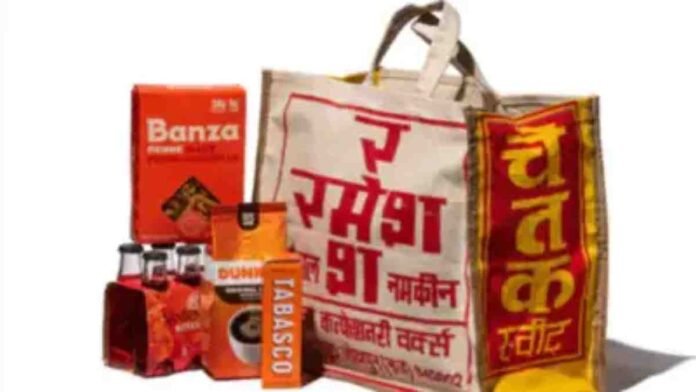The basic Indian jhola is a simple, all-purpose cotton bag that has long been linked with Indian households, college students, and activists. It has no frills and no costly leather. Now being marketed as an “Indian Souvenir Bag”, this humble jhola has suddenly gained international attention—not for its utility, but for its price tag. An American luxury shop, Nordstrom, is selling items that usually cost around 100 rupees in India, or are sometimes even given for free in local markets, for an astounding $48 (₹4,228). The listing has sparked controversy and raised questions about cultural appropriation and overpricing.
The Japanese lifestyle firm Puebco is marketing the bag in question as an “Indian Souvenir Bag” The jhola, which is made of cotton and has a Hindi script on it that looks like the packaging used for lentils and masalas, is almost exactly like the casual bags slung all over India, with one notable exception: the cost!
LOL – This is the take-home bag of a snack shop in my hometown in India.
— Sheel Mohnot (@pitdesi) May 21, 2025
for sale for $48 at Nordstrom pic.twitter.com/GNm9CJlfmZ
Social media was incredulous when pictures of the listing went viral. The fact that the bags they once used to transport groceries and veggies are now being marketed as fashionable bags by high-fashion lovers made many Indians giggle. This is an example of traditional Western rebranding and repackaging.
Social media memes compared that jhola to the instantly popular luxury bags worldwide. Others were indignant that a standard cultural product frequently connected to practicality and thrift had been turned into an expensive “exotic” item for Western buyers.
As usual, the internet was quick to react, with many users expressing a mixture of fury and amusement at what they perceived to be a precise instance of commercial exploitation and cultural appropriation. “It is not about the bag; it is about the blatant repacking of our culture without context or credit,” a commenter commented.
“Should we start exporting tiffin boxes next as artisanal lunchware?” was another cynical response. “For $48, I’ll throw in an extra hole, a steel dabba, and a packet of Maggi,” said a commenter on X.
An artist from Delhi commented, “This isn’t just tone-deaf, it’s bizarre. You can buy these for ₹60 outside Daryaganj Metro Station.”
What more will we lose as a result of Americanization?
The American controversy. Indian staples have long been rebranded as high-end fashion products. Similar criticism has been leveled at major fashion firms for selling expensive products marketed as exotic or avant-garde fashion in the West, such as rubber slippers, kurta-like tunics, and skirts in the form of lungis.
While some contend that Indian design should be honored worldwide, others maintain that it needs to be accompanied by respect, context, and an equitable appreciation of its cultural roots. Once a representation of sustainability and streetwise sensibility, the Indian Jhola is today a case study of how luxury branding and globalization can occasionally skew cultural narratives for financial gain.
To put it succinctly, one widely shared tweet read, “Call it what you want; to us, it will always be the bag you forget in the back of your dad’s scooter.”



